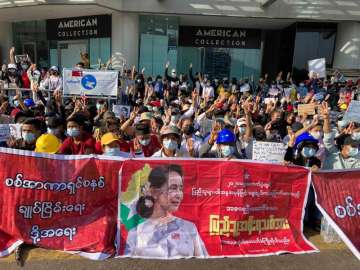Myanmar protesters back on streets despite police violence
Crowds demonstrating against the military takeover in Myanmar again defied a ban on protests Wednesday, even after security forces ratcheted up the use of force against them and raided the headquarters of the political party of ousted leader Aung San Suu Kyi.

Crowds demonstrating against the military takeover in Myanmar again defied a ban on protests Wednesday, even after security forces ratcheted up the use of force against them and raided the headquarters of the political party of ousted leader Aung San Suu Kyi.
Fresh protests were reported in Yangon and Mandalay, the country’s two biggest cities, as well as the capital Naypyitaw and elsewhere.
The protesters are demanding that power be restored to Suu Kyi’s deposed civilian government. They’re also seeking freedom for her and other governing party members since the military detained them after blocking the new session of Parliament on Feb. 1.
The military says it acted because November’s election, which Suu Kyi’s National League for Democracy won in a landslide, were marred by irregularities. The election commission had refuted the allegation.
The growing protests and the junta’s latest raid suggest there is little room for reconciliation. The military, which held power directly for five decades after a 1962 coup, used deadly force to quash a massive 1988 uprising and a 2007 revolt led by Buddhist monks.
In Naypyitaw and Mandalay on Tuesday, police sprayed water cannons and fired warning shots to try to clear away protesters. In Naypyitaw, they shot rubber bullets and apparently live rounds, wounding a woman protester, according to witnesses and footage on social media. The reports could not be independently confirmed.
Human Rights Watch cited a doctor at a Naypyitaw hospital as saying the woman was in critical condition. The doctor said the woman had a projectile lodged in her head, believed to be a bullet that had penetrated the back of the right ear, and had lost significant brain function. The doctor said a man had been also been treated with an upper body wound consistent with that of live ammunition.
“Myanmar police should immediately end the use of excessive and lethal force” against the protesters, said the statement from the New York-based watchdog.
Video from Mandalay on Tuesday showed riot police firing into the air and flailing away with batons at nonviolent demonstrators. State television network MRTV, in one of its few reports on the protests, broadcast scenes it claimed showed the protesters carrying out the violence.
Protesters have been marching in defiance of orders Monday night banning rallies and gatherings of more than five people, as well as motorized processions, while also imposing an 8 p.m. to 4 a.m. curfew.
The orders are issued locally so the extent of the areas covered is hard to gauge, but according to the Myanmar Times newspaper, they cover 90 townships in 30 cities, including all of Yangon and other areas.
The military on Tuesday night has raided the national headquarters of Suu Kyi’s party, which before the military seized power had been slated to take power for a second five-year term.
Kyi Toe, a spokesman for the party, wrote on Facebook that the army broke into the headquarters in Yangon and another office and took away documents and computer hardware. The headquarters was shuttered Wednesday.
The United States “strongly” condemned the violence against demonstrators. State Department spokesman Ned Price said Tuesday that Washington would review assistance to Myanmar so that those responsible for the coup face “significant consequences.”
“We repeat our calls for the military to relinquish power, restore democratically elected government, release those detained, and lift all telecommunication restrictions, and to refrain from violence,” Price said.
New Zealand suspended all military and high-level political contact with Myanmar, Foreign Minister Nanaia Mahuta announced in Wellington, adding that any New Zealand aid should not go to or benefit Myanmar’s military government.
The U.N. Human Rights Council, the 47-member-state body based in Geneva, is to hold a special session on Friday to consider “the human rights implications of the crisis in Myanmar.”
Britain and the European Union spearheaded the request for the session, which will amount to a high-profile public debate among diplomats over the situation in Myanmar and could lead to a resolution airing concerns about the situation or recommending international action.
READ MORE: Myanmar: Police crack down on crowds defying protest ban
READ MORE: US demands immediate, full restoration of democratically elected government in Myanmar